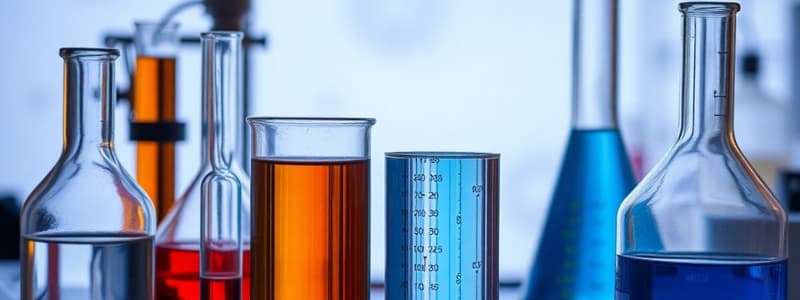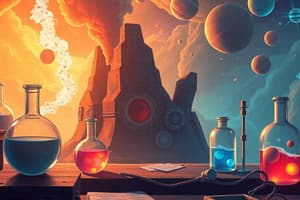Podcast
Questions and Answers
What is the independent variable in the ice melting experiment?
What is the independent variable in the ice melting experiment?
- The amount of time before measurement
- The shape of the ice cubes (correct)
- The thickness of the ice cubes
- The room conditions
Which variable is measured to observe the outcome of the experiment?
Which variable is measured to observe the outcome of the experiment?
- The time it takes for the ice to melt (correct)
- The volume of the water used
- The type of plate used
- The starting temperature of the ice
Which of the following is NOT a constant variable in the ice melting experiment?
Which of the following is NOT a constant variable in the ice melting experiment?
- The condition of the room
- The thickness of the ice cubes
- The different shapes of the ice cubes (correct)
- The type of faucet water used
What could be a possible method for collecting data in the experiment?
What could be a possible method for collecting data in the experiment?
What do you need to conclude after the experiment is conducted?
What do you need to conclude after the experiment is conducted?
What is the primary purpose of performing experiments in science?
What is the primary purpose of performing experiments in science?
What distinguishes a hypothesis from a theory in scientific research?
What distinguishes a hypothesis from a theory in scientific research?
Which of the following best describes what constants are in an experiment?
Which of the following best describes what constants are in an experiment?
What is an important factor to ensure when forming a clear question for an experiment?
What is an important factor to ensure when forming a clear question for an experiment?
Which of the following best illustrates a well-formulated hypothesis based on the content provided?
Which of the following best illustrates a well-formulated hypothesis based on the content provided?
Flashcards
Clear Question
Clear Question
A specific question that can be tested through an experiment. It should be clear and measurable.
Hypothesis
Hypothesis
A statement explaining what you think will happen in an experiment, based on previous observations or knowledge. It's an educated guess.
Constants
Constants
Factors that are kept the same throughout an experiment to ensure that only the variable being tested affects the results.
Variable
Variable
Signup and view all the flashcards
Conclusion
Conclusion
Signup and view all the flashcards
Independent Variable
Independent Variable
Signup and view all the flashcards
Dependent Variable
Dependent Variable
Signup and view all the flashcards
Data
Data
Signup and view all the flashcards
Study Notes
Purpose of Experiments
- Experiments test predictions using the scientific method.
- Experiments involve controlled steps to ensure accurate results.
Scientific Method Steps
- Ask a clear question: The question must be specific and testable.
- Example: "Do square ice cubes melt faster than half-moon shaped ice cubes?" is better than "What kind of ice cube melts faster?"
- Formulate a hypothesis: A hypothesis is an educated guess about what will happen based on past observations.
- Example: "Half-moon shaped ice cubes melt faster than square shaped ice cubes."
- Identify constants: Factors that must stay the same throughout the experiment.
- Ensure variables are isolated or accounted for.
- Example: Using the same water source, freezer time, ice thickness, surface type, room temperature, and measurement time for all ice cubes.
- Identify independent and dependent variables:
- Independent variable: The factor you change (e.g., ice shape).
- Dependent variable: The factor affected by the independent variable (e.g., melting rate).
- Measure and record data: Quantify results using appropriate measurement tools.
- Example: Measuring the height of the melting ice cubes and time to complete melting.
- Draw a conclusion: Analyze results to determine if hypothesis is supported.
- Based on data, determine if the prediction held true.
Studying That Suits You
Use AI to generate personalized quizzes and flashcards to suit your learning preferences.




